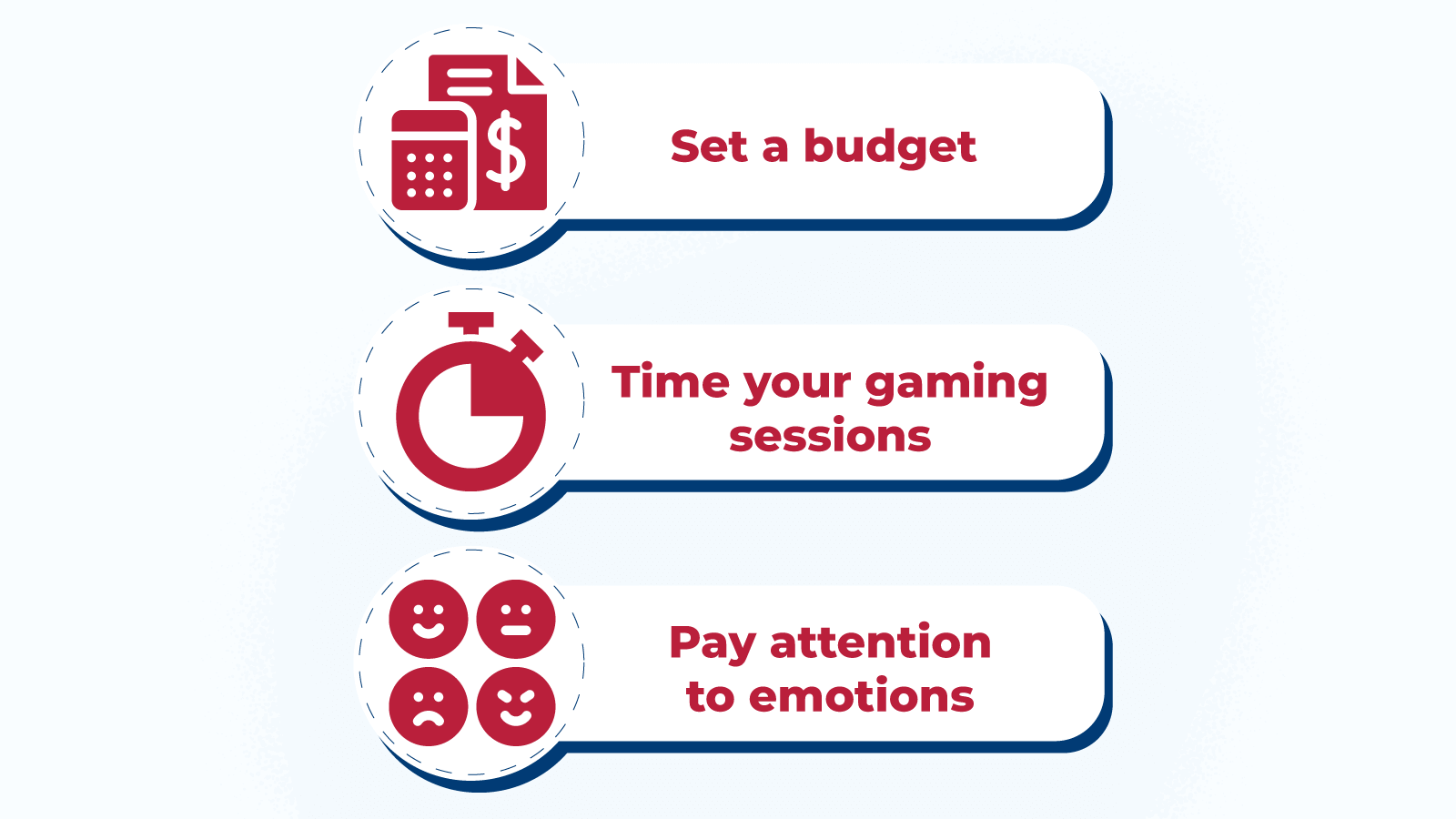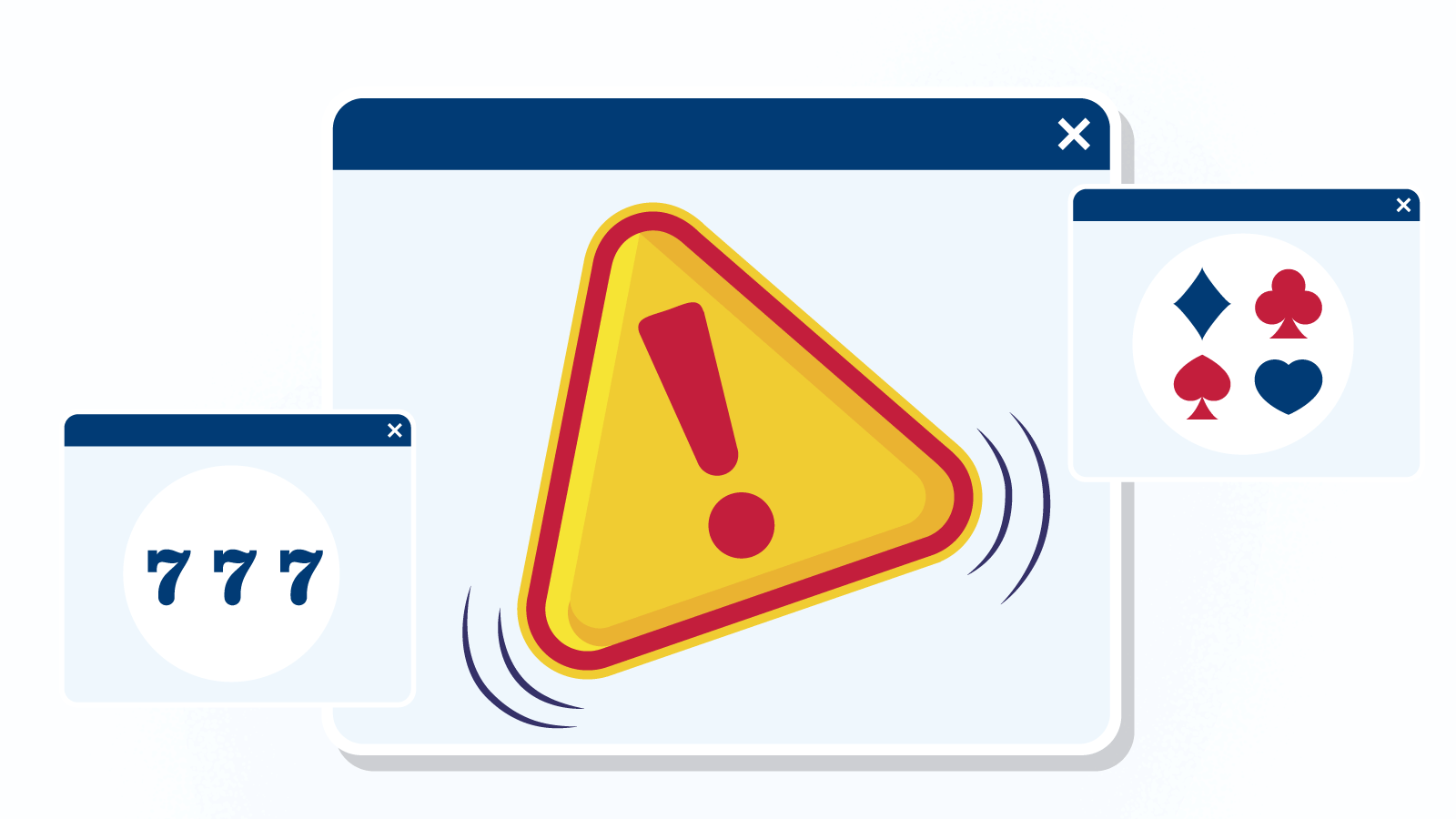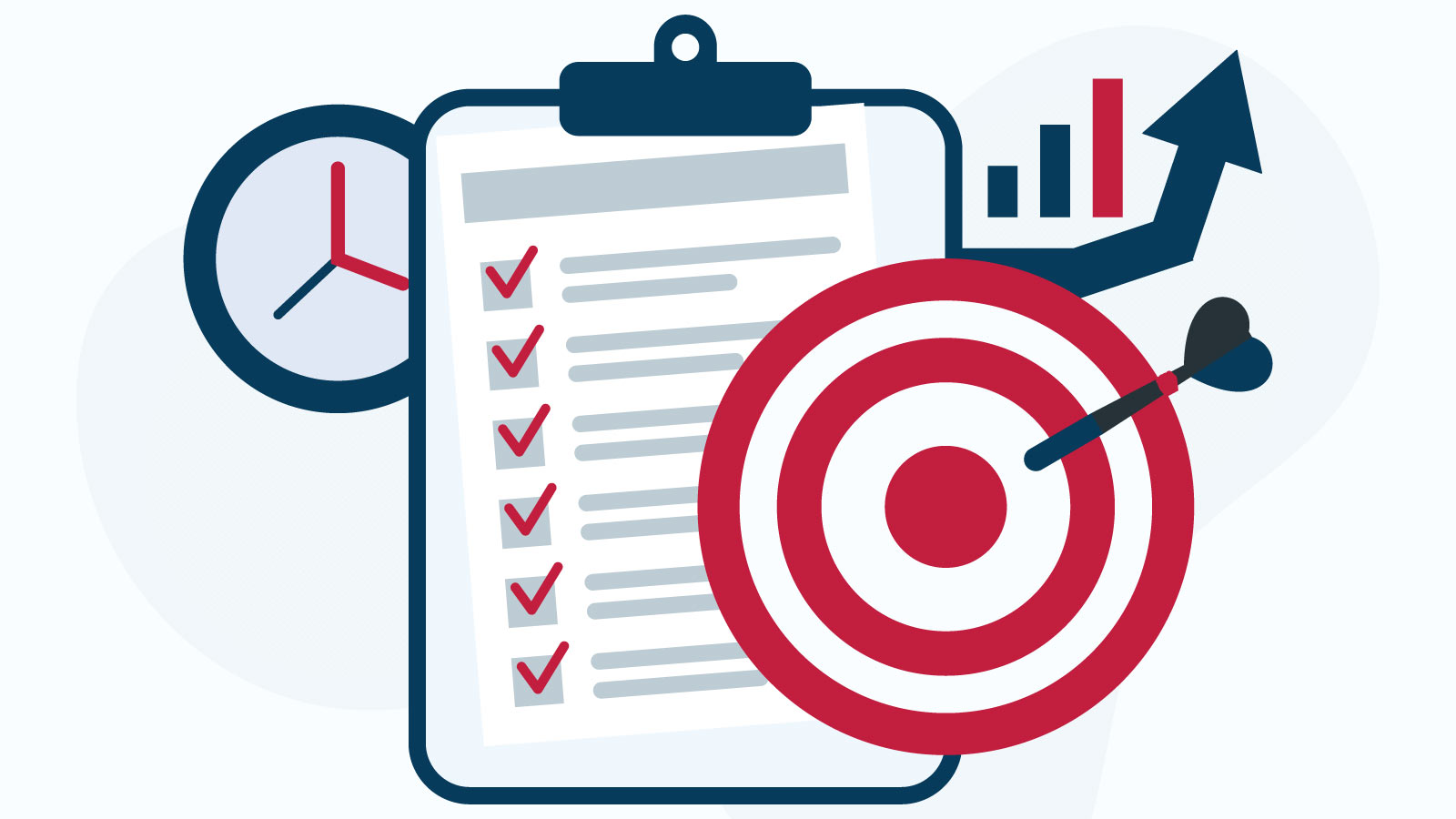Responsible Gambling in the US 2026 - Safe Gambling Tools and Support
Responsible gambling is an approach that makes sure your playing time at online casinos remains safe, fun, and under your control. Today, all legitimate online casinos implement responsible gambling policy to protect their players from the potential harms of gambling. Read on to learn how to enjoy safer gambling and how our recommended sites help you play responsibly.
- What Is Responsible Gambling?
- Why Responsible Gambling Policy Matters
- Responsible Gambling Tips
- Responsible Gambling Tools for Safer Gambling
- How to Recognize Problem Gambling
- Responsible Online Gambling: Self-Assessment Tests
- Who Oversees Safer Gambling in the US?
- What if I Have a Complaint Against an Online Gambling Operator?
- Responsible Gambling in the US – Key Takeaways
- FAQs
What Is Responsible Gambling?
Responsible gambling is the practice of making sure that you always play within your means and while remaining in control of your gambling habits. The ultimate goal is to prevent problem gambling –activities including gambling addiction, compulsive gambling, and wagering beyond your means.
Online casinos have taken a leading role in promoting safer online gambling. Reputable sites offer tools to help you set limits, provide educational resources, and allow you to self-exclude from future play, among other efforts to help mitigate the harms of problem gambling.
Why Responsible Gambling Policy Matters
Why are responsible gambling tools so important? Gambling operators have a responsibility to help prevent vulnerable individuals from engaging in what could potentially be harmful behavior. That includes preventing underage players from taking part in gambling, stopping those showing signs of compulsive gambling from continuing to play, and preventing illegal gaming activity from taking place.
Responsible gambling policy helps ensure these issues are mitigated as much as possible. The tools and policies put into place at our recommended sites will both help you set your own limits and allow you to take a step back if you are concerned about your gambling behavior.
Responsible Gambling Tips

If you want a comprehensive look at how to implement your own responsible online gambling strategy, this page will have you covered. You’ll find a lot more information about tools, helplines, and other resources by reading below. For now, however, we want to give you some key tips that can help you self-regulate your gambling activity and help prevent a problem from developing in the first place.
- Make sure you set a budget for gambling and stick to it.
- Use responsible gambling tools offered by operators, like time and deposit limits.
- Understand the risks of gambling and avoid chasing your losses.
- Treat online gambling as entertainment, not a potential source of income.
- Don’t gamble when you’re under the influence of alcohol or drugs.
- Balance your gambling activities with other hobbies as well as time with loved ones.
- Educate yourself on the odds and expected returns of each game to set realistic expectations.
If you or a loved one are struggling with gambling problems, contact:
National Council on Problem Gambling (NCPG)
24/7 National Helpline: 1-800-GAMBLER
The National Council on Problem Gambling is a national organization that works to minimize harm caused by gambling addiction. The NCPG offers resources for both players and operators to help promote responsible gambling, while also raising awareness of problem gambling and advocating for those impacted by gambling-related issues.
Responsible Gambling Tools for Safer Gambling
The responsible gambling tools offered by online casinos today range from occasional reminders of your activities to the ability to block yourself entirely from playing. Here’s a breakdown of how you can make use of each of these tools.
Self-exclusion programs
A self-exclusion program allows you to tell casinos that you no longer wish to be allowed to gamble. In many US states, you can sign up for lists that will self-exclude you for a period of time from all online and land-based casinos in that state (and often in neighboring states as well). Online casinos may also offer their own exclusion programs, while software blockers are another option to prevent yourself from playing on these sites.
Deposit limits and session timers
These are two of the most common tools found at online gambling sites to help you play responsibly. Deposit limits can be set for various timeframes (daily, weekly, monthly and so on) and won’t allow you to put more money in your account if you hit those caps. Session timers will stop you from playing for more than a pre-set amount of time before forcing you to take a break.
Reality checks
Reality checks are a softer version of the limits and timers that we described above. These alerts can be preset to warn you after you’ve played for a given length of time, deposited a certain amount, or lost a specified amount of money. You can keep going after seeing these reality checks, but just the warning is often enough to remind players that it’s time to walk away from the casino for a bit.
Blocking software
Gambling blocking software is designed to prevent you from accessing gaming websites such as online casinos from the device the software is installed on. A couple of the most trusted gambling-specific blocking software options include:
- Gamban – this software is designed to block access to online gambling content and apps across multiple devices. You can access Gamban through a paid subscription or free through some support programs.
- BetBlocker – a free alternative to Gamban that offers similar services at no cost. With BetBlocker you can block access to thousands of online gambling sites and set exclusion periods to limit gambling activity.
How to Recognize Problem Gambling

While problem gambling can often go under the radar, there are signs that you can learn to recognize that can help you identify this issue early before it gets out of control. Often, these signs relate to individual’s emotional, financial, and physical wellbeing. Here’s a look at a few of the warning signs that can signal a compulsive gambling problem.
- Gambling more than you can afford to lose or have budgeted.
- Chasing your losses in an effort to win back lost funds.
- Feeling a need to hide your gambling activities from friends and family.
- Neglecting work, family, or social responsibilities to gamble.
- Finding that the urge to gamble makes it difficult to focus on other activities.
- Feeling irritable when trying to cut down on gambling.
- Borrowing money for gambling purposes.
Responsible Online Gambling: Self-Assessment Tests
Are you concerned that you or someone you know might have a gambling problem?
The following trusted self-assessment test can give you a better idea of whether you are at risk for, or may already have, an issue with problem gambling.
National Council on Problem Gambling (NCPG) Self-Assessment
Who Oversees Safer Gambling in the US?
Because most gambling activity in the United States is controlled at the state level, most government resources for responsible gambling are offered at the state level. However, there are also some national organizations that offer support to those who are struggling with problem gambling or have questions about responsible gambling rules.
The leading national group in this field is the National Council on Problem Gambling (NCPG). The NCPG advocates for gamblers who have been impacted by problem gambling and provides numerous resources covering every aspect of the gaming industry. In addition, the NCPG works with state responsible gaming organizations to provide support tailored to gamblers in each state.
For states with legal online casino gambling:
| State | NCPG State Affiliate Responsible Gambling Body |
|---|---|
Connecticut | |
Delaware | |
Michigan | |
New Jersey | |
Pennsylvania | |
West Virginia |
For states with legal online sports betting:
| State | NCPG State Affiliate Responsible Gambling Body |
|---|---|
Tennessee | Tennessee Association of Alcohol, Drug & Other Addiction Services |
Wyoming | |
Virginia | |
North Carolina | |
Kentucky | |
Arkansas | |
Colorado | |
New Hampshire | |
Oregon | |
Rhode Island |
For states with legal online sports betting:
| State | NCPG State Affiliate Responsible Gambling Body |
|---|---|
Arizona | |
Illinois | |
Indiana | |
Iowa | Iowa Department of Public Health – Gambling Treatment Program |
Kansas | |
Louisiana | |
Maryland | |
Massachusetts | |
Mississippi | |
Montana | |
Nevada | |
New York | |
Ohio | |
Washington D.C. |
For states with legal online poker:
| State | NCPG State Affiliate Responsible Gambling Body |
|---|---|
Nevada | |
Delaware | |
New Jersey | |
Pennsylvania | |
Michigan | |
West Virginia |
What if I Have a Complaint Against an Online Gambling Operator?
While most gambling complaints are about unregulated sites, even reputable online casinos receive consumer complaints. If you feel you’ve been treated unfairly by an online casino or other gambling site, you can submit your claim to a complaint management service to have your case heard.
Our top recommended gambling complaints service
CasinoReviews.com is a free online gambling complaints service that mediates player-operator disputes. To get started, we recommend submitting your complaint for review by the experienced dispute resolution team at CasinoReviews.
- 10+ years of experience
- 8,000 complaints managed
- CiARB qualified team
Responsible Gambling in the US – Key Takeaways

We’ve given you a lot of information on this page, and we hope that we’ve helped you understand how you can enjoy safer online gambling. The key point is that responsible gambling is the key to having a fun and safe experience while playing at online casinos. If you’d like a refresher on the finer details, here’s a list of our top responsible gambling tips.
- Only play at regulated, reputable online casinos like the ones our experts recommend.
- Understand the terms and conditions when you play at any online casino.
- Be sure to use responsible gambling tools available from online casinos and other organizations.
- Familiarize yourself with the national, state, or other regional regulations that govern gambling where you live.
- Be sure to understand the signs of problem gambling so you can recognize it in yourself or loved ones.
- If you or someone you know has a gambling problem, seek professional help to assist you in dealing with that issue.
FAQs
What is responsible gambling?
Responsible gambling is an approach designed to ensure that your gambling activities remain safe, fun, and controlled. The goal is to prevent gambling problems before they start, and to recognize the signs of compulsive gambling early on.
How can I gamble responsibly?
There are many strategies you can use to ensure you gamble responsibly. Some of the key tips to remember include always gambling within your means, not chasing losses, and balancing your gambling activities with other interests and responsibilities.
What is self-exclusion in gambling?
Self-exclusion programs allow you to tell a gambling operator that you do not want to be allowed to play on their website or in their venue. Both land-based and online casinos offer self-exclusion, and joining a self-exclusion list means you will be barred from any gaming activity at the impacted casinos.
What organizations support responsible gambling in the US?
The leading national organization supporting responsible gambling in the United States is the National Council on Problem Gambling (NCPG), a nonprofit dedicated to representing the needs of problem gambling and promoting responsible gambling. The NCPG also works with many state-level organizations to promote safer gambling habits.
Who can I call for help with problem gambling in the US?
If you want to reach out for help with problem gambling, the National Council on Problem Gambling (NCPG) may be your best resource. You can call their 24/7 National Helpline at 1-800-GAMBLER for advice and assistance in finding other resources.
What if I or someone close to me is facing a gambling problem in the US?
If you are aware that you or a loved one has a gambling problem, the best course of action is to find a trained professional to help you through the recovery process. For more information on local resources available to you, call the National Council on Problem Gambling 24/7 National Helpline at 1-800-GAMBLER.